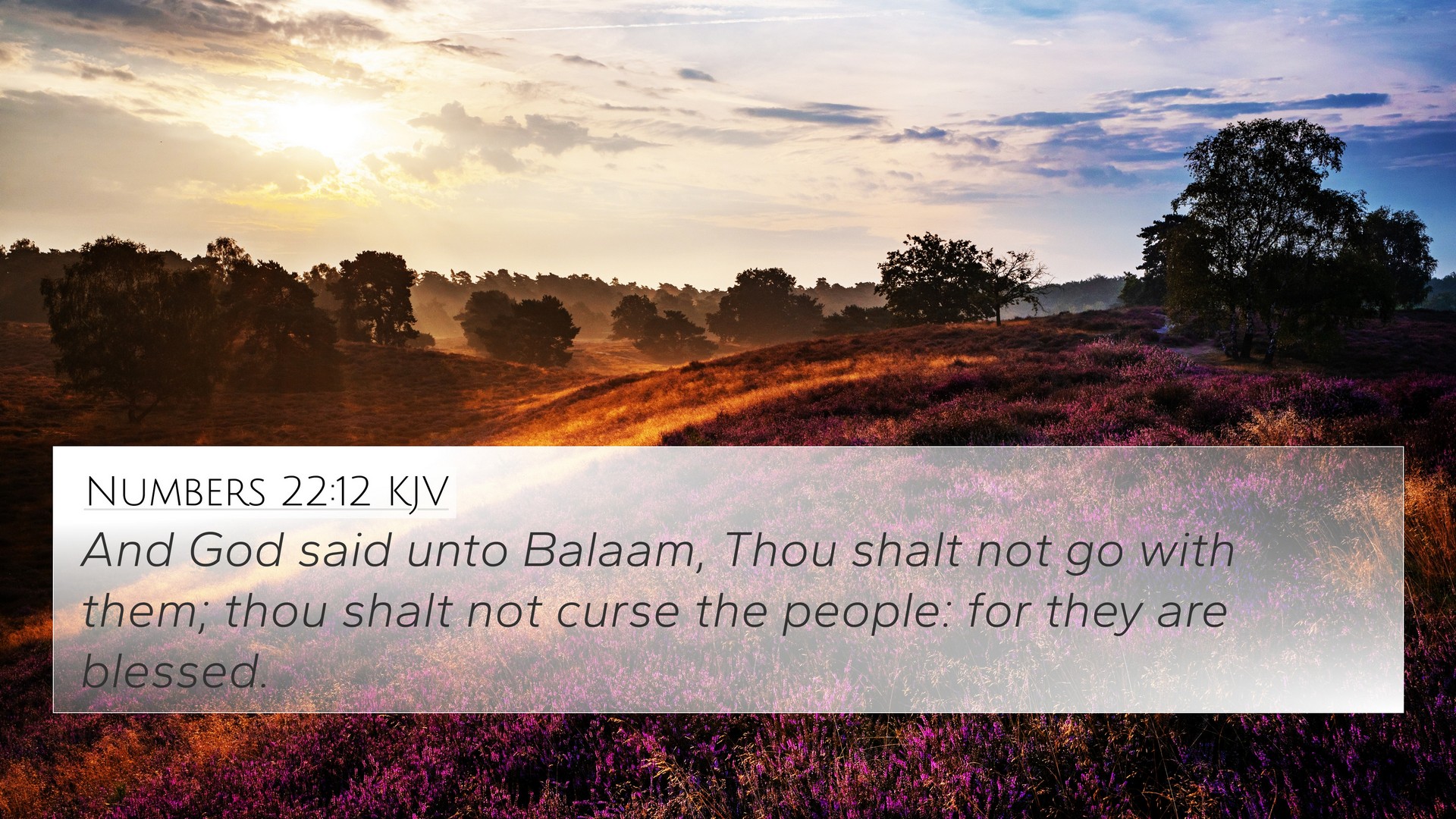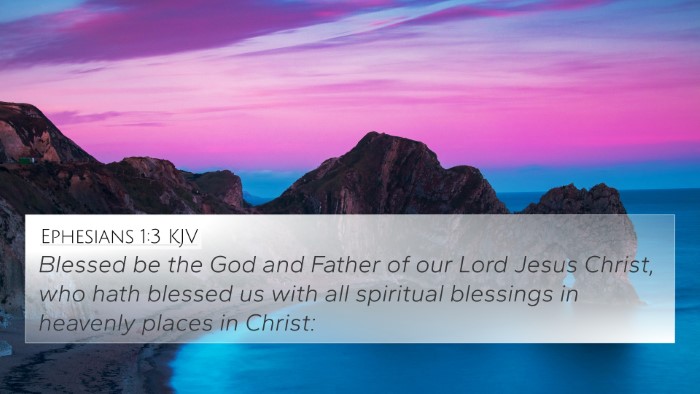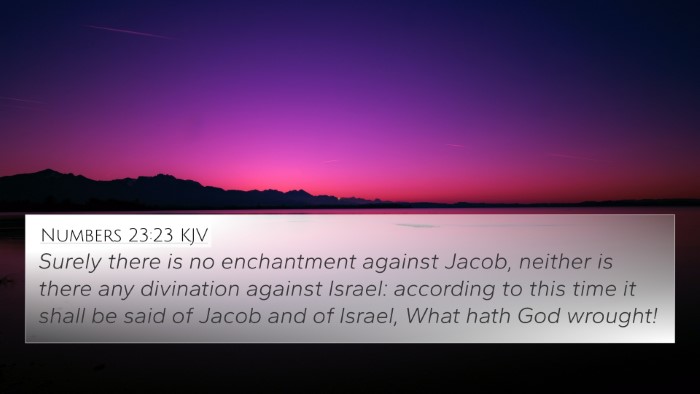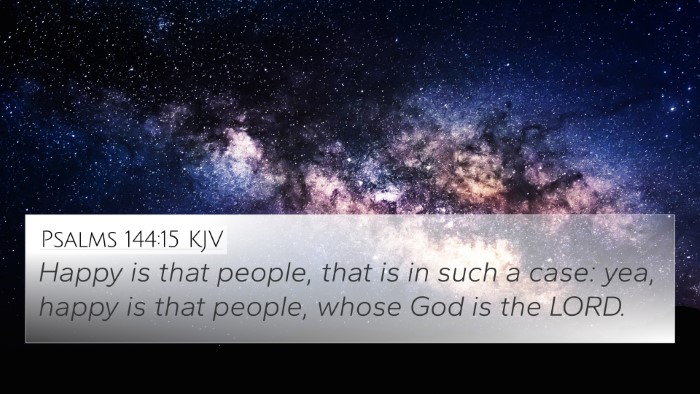Understanding Numbers 22:12
Numbers 22:12 states: "And God said unto Balaam, Thou shalt not go with them; thou shalt not curse the people: for they are blessed."
Analysis and Interpretation:
This verse forms a crucial part of the narrative concerning Balaam and his encounter with Balak, king of Moab, who sought to hire Balaam to curse the Israelites. The importance of divine guidance, obedience, and God’s sovereign decisions come into play in this narrative.
Insights from Public Domain Commentaries
- Matthew Henry: He emphasizes the sovereignty of God in this passage and how His will must prevail over human intentions. God's refusal to allow Balaam to curse His people demonstrates His protective nature over Israel.
- Albert Barnes: Barnes elaborates on the nature of Balaam’s mission, explaining that Balaam’s desire for wealth led him to seek divine endorsement for his actions. However, God's direct communication signifies that He will not permit any harm to come to the Israelites.
- Adam Clarke: Clarke discusses the character of Balaam and his struggle between divine command and personal gain. He notes that God’s declaration serves as a clear directive, illustrating that God’s blessings cannot be revoked or overridden by human agendas.
Thematic Connections
The verse connects with broader themes throughout the Bible, especially concerning God's covenant with Israel and the importance of adhering to His commandments. This also informs the concept of blessings and curses, linking it to other scripture that discusses divine favor and condemnation.
Cross-References
- Genesis 12:3: "And I will bless them that bless thee, and curse him that curseth thee." - This establishes God’s promise of blessing upon Abraham's descendants.
- Deuteronomy 23:5: "Nevertheless the Lord thy God would not hearken unto Balaam; but the Lord thy God turned the curse into a blessing unto thee." - Signifying God’s ability to convert curses into blessings for His chosen people.
- Psalm 105:15: "Saying, Touch not mine anointed, and do my prophets no harm." - Another affirmation of God’s protection over His appointed ones.
- Romans 11:29: "For the gifts and calling of God are without repentance." - This reinforces the notion of irrevocable blessings from God.
- Isaiah 54:17: "No weapon that is formed against thee shall prosper; and every tongue that shall rise against thee in judgment thou shalt condemn." - A declaration of God’s safeguarding of His people.
- Proverbs 26:2: "As the bird by wandering, as the swallow by flying, so the curse causeless shall not come." - Emphasizing that curses without cause are ineffective.
- Galatians 3:13: "Christ hath redeemed us from the curse of the law, being made a curse for us." - Relating to the ultimate blessing of redemption through Christ.
- Exodus 23:22: "But if thou shalt indeed obey his voice, and do all that I speak; then I will be an enemy unto thine enemies, and an adversary unto thine adversaries." - Highlighting the rewards of obedience to God’s commandments.
- James 3:10: "Out of the same mouth proceedeth blessing and cursing. My brethren, these things ought not so to be." - A reminder of the power of speech and its consequences.
- 1 Peter 3:9: "Not rendering evil for evil, or railing for railing: but contrariwise blessing; knowing that ye are thereunto called, that ye should inherit a blessing." - This encapsulates the theme of returning good for evil, reinforcing the concept of blessings.
Summary
In Numbers 22:12, the dialogue between God and Balaam reveals a significant spiritual principle: God's blessings on His people are unwavering and protected against all attempts to curse them. Through divine communication, God establishes not only His authority but also the assurance that His people are under His guardianship. This verse is firmly anchored within the broader biblical narrative of obedience, blessing, and the established covenant made with Israel, linking it to the overarching themes of divine protection and providence throughout scripture.
Utility of Cross-Referencing
For those studying this verse, utilizing tools for Bible cross-referencing can illuminate the connections between biblical texts, enhancing your understanding of interrelated themes. By employing a Bible cross-reference guide or a comprehensive Bible concordance, you can uncover deeper meanings and thematic parallels across the scriptures.



















